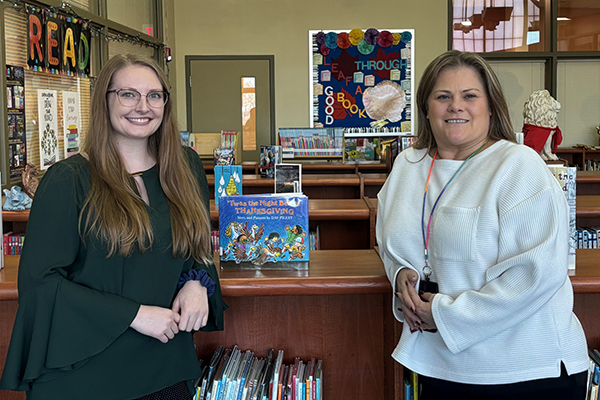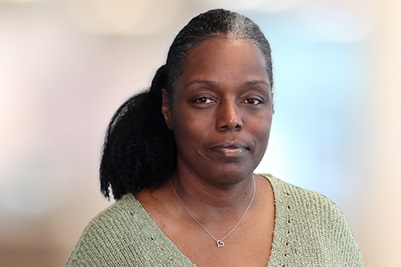
In many communities, there’s a wall between public school systems and private child care programs.
There may be little communication or collaboration. Providers care for younger children and hand them off to their local school when it’s time for preschool or Kindergarten.
“There’s a disconnect nationwide,” said Tracy Jones, an early childhood specialist at the Buffett Early Childhood Institute at the University of Nebraska.
The Omaha Public Schools is taking a different tack. Two years ago, the district created community facilitator positions intended to bridge the gap between local child care providers and its elementary schools.
Community facilitator Claire Cordes is based at Mount View and Pinewood elementary schools in North Omaha, and Jolene Martinez works out of Liberty and Gomez Heritage elementary schools in downtown and South Omaha.
Those four schools serve as School as Hub schools under the Superintendents’ Early Childhood Plan.
The Superintendents’ Plan is a collaborative effort of the 11 school districts in metro Omaha that make up the Learning Community of Douglas and Sarpy Counties to develop early childhood programs, especially for children living in poverty. The Buffett Institute provides leadership and support for the plan.
The School as Hub approach is centered around the idea that schools can serve as the “hub” to connect families to resources even before their child is born. OPS started with two community facilitators and quickly expanded. Today, there are six facilitators funded by the Learning Community and supported by the Buffett Institute spread out among 10 of the district’s schools.
“This collaborative effort ensures that the child and their family are set up for success as they transition into school,” said Melissa Prante, the early childhood coordinator at OPS.
Cordes and Martinez work with 15 child care programs. They provide training and supplies, promote early literacy skills, prepare students for the transition to preschool or Kindergarten, and connect future OPS families with services like speech, behavioral therapy, or English as a Second Language classes.
“We're able to see these kiddos before they even get into school,” Martinez said. “And so, if there is a delay, or an emotional imbalance or dysregulation, we can help with the referral process.”
Facilitators learn more about each child care program they work with—whether it’s licensed, what staff need to support students, if they have any ties to the local school—and what goals providers want to work toward.
Early childhood care and education is provided in a variety of settings in the United States, in what’s often called a mixed-delivery system. Young children may attend child care programs at public schools, private centers, charter schools, in homes, or at faith-based institutions.
That can create an undercurrent of competition between publicly funded schools that provide early childhood programming and community child care providers who run their own businesses.
OPS enrolls nearly 52,000 kids, including roughly 2,200 early learners in Head Start, Early Head Start, and PreK programs. Elementary schools don’t have capacity for every young child in the district, and some families prefer to send their child to a local in-home provider or religious program anyway.
Martinez and Cordes want early educators to view them as a teammate and partner, not a rival.
“They see we’re not here to take their kids,” Martinez said. “They feel like we are respecting them. They're not a daycare, they're not babysitters. They are early childhood professionals that are molding these kids before they even get into school.”
 Tracy Jones
Tracy JonesJones, who works closely with the OPS facilitators, said trust is slowly being established—some providers are still wary that facilitators will inspect their program or persuade families to enroll their kids in OPS preschools instead.
“We're there as a resource,” she said. “We’re there to work with them, not against them.”
Jones previously taught Kindergarten and first grade, including in OPS. She saw students and families who needed more guidance before they entered the K-12 school system. Parents were surprised by the academic rigor of Kindergarten and testing requirements.
“Kindergarten is its own little bubble,” she said. “I really don’t think it’s intentional, but that’s just how the educational world has separated and focused.”
She encourages facilitators to set up opportunities for kids to visit their local schools and practice some simple transition activities—walking in a line, visiting the cafeteria, drinking from a water fountain. Providers might be invited to school events, like the holiday concert or back-to-school barbecue.
In 2022, the Buffett Institute, Nebraska Department of Education, and community partners created a set of Kindergarten transition guides for families, child care providers, and school districts.
Martinez said the South Omaha providers she works with can’t always make the drive out to Educational Service Unit 3, near 110th and Harrison Streets, for training.
So, when numerous providers mentioned needing more help working with students with autism spectrum disorders, she brought professional development to them via a series of Saturday workshops at Gomez Heritage with the Munroe-Meyer Institute at the University of Nebraska Medical Center.
Cordes visits programs and models different learning activities to strengthen fine motor skills. She tracks which providers have openings and who provides transportation or weekend hours, and operates a lending library with books, puzzles, and other supplies that providers can use.
“The programs that I work with, they really like that the staff is involved with whatever I'm doing,” Cordes said. “It’s also beneficial for me to see how the kids listen to their teachers and see, well, would they listen to another person that comes in?”
Jones hopes more districts in the Learning Community and nationwide learn and borrow from OPS’s innovative community facilitator model.
“It’s needed,” she said.
Erin Duffy is the managing editor at the Buffett Early Childhood Institute at the University of Nebraska and writes about early childhood issues that affect children, families, educators, and communities. Previously, she spent more than a decade covering education stories and more for daily newspapers.

